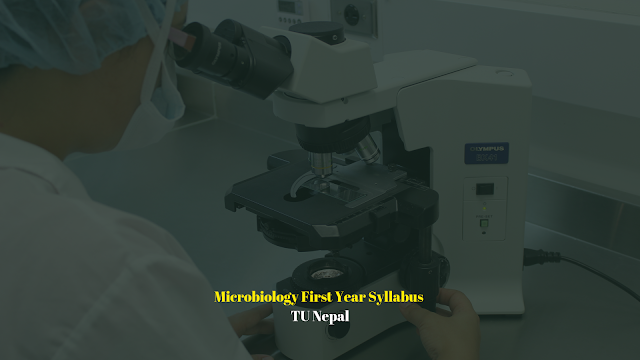Course title: General Microbiology Course No. MB 101(Major)
Full marks: 100 Pass marks: 35
Nature of course: Theory year: 1
Course objectives The major objective of the course is to provide fundamental knowledge of microbiology. After completion of courses, the students will be able to:
• Understand the concept of the microorganism, history of microbiology, classification schemes and the nomenclature of microorganisms, scope and application of microbiology.
• Know handling, methods, growth, physiology, metabolism, genetics of microorganisms.
• Understand the basics of bacteriology, virology, mycology and parasitology.
History and development of Microbiology 6 hrs
Development of microorganisms with reference to the modern era, important discoveries, theories of spontaneous generation and the germ theory of disease (Louis Pasteur, Robert Koch)
Classification and nomenclature of microorganisms 15 hrs
Classification schemes of living organisms, differential characteristics of prokaryotic and eukaryotic microorganisms, general principle of nomenclature, three and five kingdom concepts, basic understanding of the classification of bacteria, viruses, fungi and protozoa classification, nomenclature and characterization of bacteria according to Bergey's Manual of Systemic Bacteriology.
Scope and applications of microbiology 7 hrs
Harmful and beneficial microorganisms, applied microbiology (Medical, public health, agricultural, food, biotechnology, environmental, industrial, pharmaceutical microbiology).
Morphology of bacteria 10hrs
Structure of bacteria, morphology and fine structure of cell organelles, differences between Gram-positive and Gram-negative bacteria.
Growth and physiology of bacteria 8 hrs
Nutritional types of bacteria (photo lithotrophic, chemolithotrophic, photo organotrophic, chemoorganotrophic), entry of nutrients, passive and active transport, bacterial growth, growth curve, factors affecting growth.
Isolation and enumeration and culture of bacteria 10 hrs
Types of bacteriological culture medium, techniques for isolation and enumeration of bacteria (streak plate technique, pour plate technique, spread plate technique, membrane filtration, most probable number, direct microscopic count), biochemical tests of bacteria, methods of the culture of anaerobic bacteria culture preservation methods.
Metabolism 15 hrs
Introduction to metabolism, regulation and energy involved in Glycolysis (Embden Meyerhoff (EMP) Pathway, glycogenesis, glycogenolysis, tricarboxylic acid (TCA) cycle, pentose phosphate pathway, Vintner Wodoroff's (ED) pathway, phosphoketolase pathway, fermentative pathway and electron transport system
Microbial genetics 15 hrs
Structure and function of prokaryotic DNA, genetic code, plasmids, concepts of bacterial genetics and role of RNA and DNA, bacterial recombination (transformation, conjugation and transduction), types and importance of mutation.
Microscopy and different technique of handling of microorganisms 8 hrs
Microscope (light, stereo, dark field, phase contrast, electron and fluorescence), types of staining methods for microorganisms, aseptic techniques in microbiology.
Techniques in control of microorganisms 12 hrs
Principles, procedures and applications of disinfection and sterilization: temperature, irradiation, filtration chemicals, antibiotics and chemotherapeutic agents
Host parasitic interaction and immunology 14 hrs
Normal microbial flora of human body, the concept of host parasitic relationship, the concept of immunity.
Introduction to Virology 12 hrs
General structure (Size symmetry and shape)of the virus, classification schemes, viral genetics detection, enumeration (plague assay, haemagglutination test, quantitative PCR, neutralization test) cultivation of viruses.
Introduction to Parasitology 12 hrs
Origin morphology and classification of parasites (blood, tissue, intestinal parasites, soil-transmitted helminths and nematodes), the technique of detection, enumeration and identification of protozoan and helminthic parasites.
Introduction to mycology 12 hrs
Origin, morphology, and medical classification of fungi. Techniques of isolation, morphological identification, culture and enumeration of yeast and mold.
©MicrobiologyNotes Free Online Notes 

Hello,
ReplyDeleteCan you provide me a complete syllabus of all subjects in B.Sc. Microbiology?